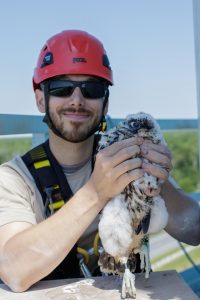New Jersey Falcons Remain Stable in 2017
Nests on towers and buildings maintain stability in the state population
by Ben Wurst, Habitat Program Manager

Results from the 2017 nesting season for peregrine falcons was released in a report from New Jersey Fish & Wildlife’s Endangered Species Program, and falcons had a decent year. New Jersey’s population remained stable with 32 active nests (with 34 known pairs) as compared to last years’ results of 30 active nests (35 known pairs). Nest success was slightly better than last year, with 22 pairs producing 52 young as compared to 20 pairs producing 47 young. The productivity rate, which is a measure of the health of the population, was very close to what was observed in 2016 at 1.59 young/active nest.

Peregrine falcons nest throughout all areas of the state on man-made and natural cliff sites. Nesting structures consist of converted hacking towers along the coast, buildings in urban areas, bridges, and natural cliff sites. The core of the population (17 pairs) persist on towers and buildings, and had the highest fledging rate in 2017. A total of 31 young were produced at these sites last year. A parasitic, wingless flies continues to cause some mortality in young falcons at these sites. Each year we routinely clean out and treat nestboxes to hold back large infestations of the flies, but the flies persevere.
Nine pairs nested on bridges in 2017, with 5 being located completely within New Jersey and the remainder lying on our border with Pennsylvania along the Delaware River. A total of 19 young fledged from these bridge sites last year. With some nests on bridges, it is difficult to confirm nesting or not with limited staff and many areas being inaccessible or visible from the ground.
Pairs that nest on natural cliff sites continue to struggle and nest success declined in 2017. The 6 nesting pairs that occupy these nest sites only fledged two young, as compared to 7 pairs producing 8 young in 2016. Ensuring the successful nest attempts of these sites is difficult since they are hard to access and viewed after leaf-out in spring. As we’ve seen in previous years, predators and weather play a larger role in influencing the success of these natural nest sites.
As many saw online, via the Jersey City Falcon Cam, the pair produced their first young since two unsuccessful nest attempts. We watched online as BD/62 fledged from her nest in mid-July. She was re-sighted by her band in DeKorte Park in the Meadowlands in September, so we know she’s alive and well in North Jersey! The Falcon Cam will begin streaming in March for the 2018 nesting season.
In other news, the location where wild nesting first occurred in 1980, at Forsythe NWR in Oceanville, was removed by ENSP & U.S. Fish & Wildlife Service in late 2017. The tower was in need of major repairs, and refuge staff believed that the falcons were deterring use of the impoundments by migrating waterfowl and shorebirds, their target species for active management. NJ Fish & Wildlife biologists found a suitable location nearby to install a new nestbox with hopes that the pair who nested at Forsythe in 2017 will find the site and nest there in the future. Despite the removal of this historic nest site, falcons (NJ natives and long distance migrants) will still forage at Forsythe NWR since the impoundments hold tremendous prey abundance during spring and fall migration.
Thank you all our volunteers and everyone who supports our work with falcons, including education and outreach through the Falcon Cam! We continue to work with NJ Fish and Wildlife to monitor known nest sites throughout New Jersey, which is critical to their long term stability. This winter we will be installing a new nesting tower on Bonnet Island to provide a more stable nest site for a pair of falcons who’ve nested on the Causeway Bridge (Route 72) in Stafford Township. Stay tuned for more updates on this project, and if you’re interested in volunteering, please shoot me an email!
- Read full results in the 2017 Peregrine Falcon Project Report
- Learn more about Peregrine falcons
- Learn more about the NJ Falcon Project